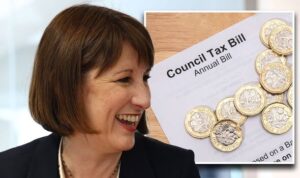
Waspi stands for Women Against State Pension Injustice and represents around 3.8million women born in the 1950s hit by moves to lift their retirement age into line with men. Some only heard the bad news weeks before they were retired, because the Department for Work and Pensions (DWP) failed to pass the message on.
In 2021, the Parliamentary & Health Service Ombudsman (PHSO) ruled this failing “maladministration”.
In March, it said Waspis deserved compensation of between £1,000 and £2,950, and told Parliament to hurry up and give it to them.
With the Tories heading for defeat in July’s general election, many Waspi women were pinning their hopes on a Labour victory. Why? Because they thought Labour leader Keir Starmer had their backs. He made his support plain and in public.
In March 2022, I broke the news that Starmer had come out firmly in favour of Waspi demands for compensation.
He cheerfully posed with Scottish Waspi campaigners holding up a pledge card stating: “I support fair and fast compensation for 1950s women.”
What could be clearer than that?
Waspi women saw this as a huge boost in their battle for redress.
On April 30 this year, Starmer said of Waspi women: “They’ve been put in an awful position, a position they shouldn’t be put in. It’s a huge injustice.”
He doubled down on May 31 saying: “The Ombudsman’s report came out I don’t know how many months ago now and the Government should have responded and they haven’t done so … it is shocking that the Government hasn’t dealt with it.”
Chancellor Rachel Reeves chipped in on June 4 simply saying: “I recognise that injustice.”
Now Starmer and Reeves are in power, it looks like they’re behaving the same way as the Tories.
It’s a huge injustice, to coin a phrase.
In May I wrote: Waspi women warning: the closer Starmer gets to power, the less he wants to know you.
In August I pointed out that Starmer decried Waspi women ‘injustice’ when he needed their votes, but was singing a different tune as PM.
The latest development looks like a huge blow to women’s hopes of compensation. It comes from Paul Lewis, financial journalist and broadcaster on the BBC, and presenter of the popular Money Box programme.
Paul knows more about the state pension than any journalist, and he’s been reading the runes. It spells bad news for Waspi.
This afternoon he tweeted comments by Emma Reynolds, who is both the Parliamentary Secretary of HM Treasury, and the Parliamentary under Secretary of State for Work and Pensions.
She wrote: “The Government believes the best way to support people, including women who have been affected by the change to the State Pension Age, is to help them to retrain, return to our progress in work.
“That is why the Government is performing employment support to ensure it supports people of all ages and we will set up more details in a forthcoming White Paper.
“For those women who are unable to work but who are not eligible for pensioner benefits because of their age, financial support is still available through the welfare system.”
Reynolds used a lot of words to convey a simply message: There’s nothing for Waspi women.
That’s certainly Paul Lewis’ view.
He wrote: “This looks like no compensation for 50s born women over state pension age rises which was recommended by Ombudsman.”
I’ll repeat that: “no compensation for 50s born women”.
That’s quite a big assumption to make. This certainly isn’t an official Labour announcement. The Waspi women I’ve been speaking to are assuming the worst, but as yet we can’t say for sure.
Lewis merely adds that Emma Reynolds heads two separate government departments, as the twin job title I posted above shows. “The DWP under-sec may want to pay but the Treasury Parly Sec (who outranks) says no!”
This isn’t official confirmation of the government’s position. Waspi hopes haven’t been officially dashed. Knowing them as I do, they won’t give up the fight yet.
Perhaps Starmer will live up to his pledge and compensate Waspi women. I fear it’s another of those “difficult decisions” Starmer and Reeves have warned us about, such as axing the Winter Fuel Payment and social care cap.
If I’m right, many pensioners will be asking the same question: Why always us?


















